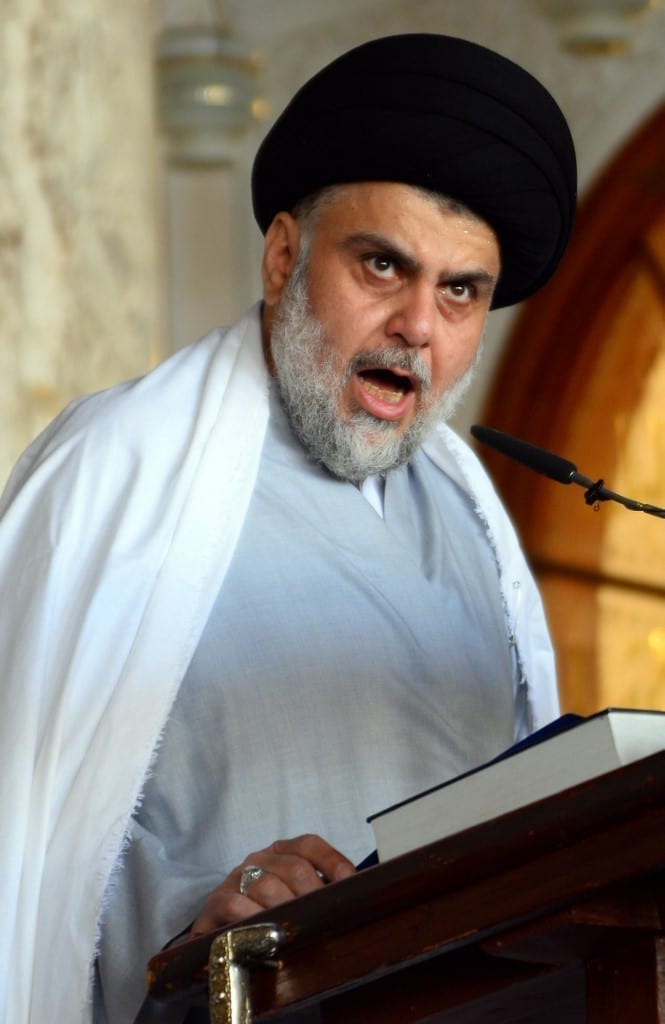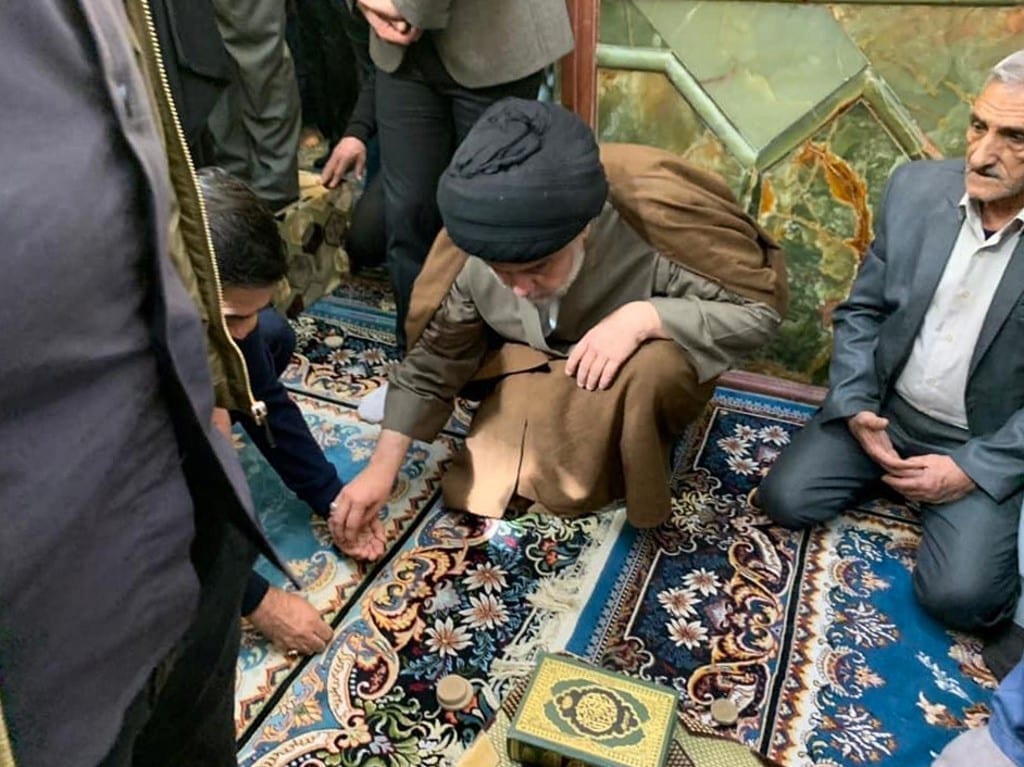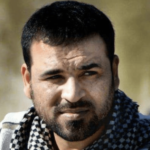
Blindfolded and waving his hand to a group of people who do not appear in the picture, this is how he appeared in his photos that went viral on social media.
Perhaps he was trying to deflect the ire of his identified kidnappers, hoping to survive. The crime of this young man, who was not yet twenty years old, was that he publicly criticized the Shiite leader Muqtada al-Sadr. In response, a group of al-Sadr loyalists immediately arrived to punish and defame him, and of course take photos of him, posting them all over the Internet to stir up terror among the Iraqi citizens who are discontent with what the leader and his supporters are doing.
Just four photos of the young victim could summarize what everyone who dares to criticize the violent Sadrist movement in Iraq is exposed to. One of these photos shows him blindfolded pleading to the kidnappers to release him, two other photos show him half-naked, and the last photo shows a hand extending to pull his ear,as directed by Muqtada al-Sadr to his followers, to punish anyone who offends or criticizes the Sadrist movement or the al-Sadr family.
“Pulling the ear” is an expression adopted by Muqtada al-Sadr himself, and he admitted it when his “Blue Hats” militia attacked the protesters sit-in spaces in Iraq, especially in Tahrir Square in Baghdad and the sit-in space in Najaf, in which at least seven people were killed and more than 100 wounded. That was in early February 2020, when Muqtada al-Sadr was in Iran and turned his back on the demonstrators, and ordered his supporters to withdraw from the popular marches and mobilize a march of one million against the American presence in Iraq in cooperation with the pro-Iranian militia.
The previous incident was not the only one, as another young man named Abd-Hikmat appeared in another video footage standing under a large sign bearing a picture of Muqtada Al-Sadr and his father and brothers, along with a phrase written in a large font saying: “Al-Sadr family are the people of guidance and generosity”. The young man appears talking in a humiliating way to the sign asking forgiveness of the “esteemed” Sadr family for the criticism he made against them, and the Mahdi Army militia, and the Peace Companies “Saraya Al-Salam”, while as usual, Sadr supporters stood behind their cameras to photograph him.
Before this young man turns himself in to his executioners, the video shows us footage of Sadr’s followers, in black costumes and masks, and armed with light weapons attacking Hikmat’s house, threatening him with retribution.
The young man was not at home at the time, but the attackers threatened him that, upon his arrest, they would kill him and then cut and cook him. This threat is documented in a video they broadcast to show off their loyalty to their leader.
He then turned himself in to the group, apologized to the camera and asked for forgiveness of al-Sadr and his followers, and then they took him to the car and put him in the back, in order to humiliate him and punish him.
The situation in the Iraqi capital, Baghdad, is not much better than it is in Basra. Whoever criticizes Al-Sadr and his followers will get his portion of punishment and humiliation, but this time the victim’s family are the ones who will carry out this task. The father, brothers and cousins will arrest the son (who criticized Al-Sadr), shaving his head and insulting him, and then asking for the forgiveness of Muqtada Al-Sadr for criticism their son made against him. Rather, what is more is that the father may disown his son in writing, and offer him as an immolation to the leader (Muqtada al-Sadr) and the Peace Companies “Saraya Al-Salam”, and the Mahdi Army.
The Iraqi judge and former head of the Integrity Commission, Rahim al-Aqili, wrote about this specific incident, describing it as a dilemma for the family if they did not prove their goodwill by punishing their son. That they, on the one hand, fear for the life of their son, and, on the other hand, fear for themselves, so they prefer to publicly humiliate their son, seeking safety and peace for him and for themselves as well.
Al-Aqili says that the biggest sin is the loss of the sense of security and safety, and that the most dangerous thing that society may lose is reassurance and peace that can only be achieved through strong and effective legal methods, which do not exist in Iraq.
These three incidents caused controversy in Iraq, topping the list of public opinion cases in this country, which is crowded with many incidents, calamities, gangs, companies, corruption, ethnic quotas, killing, poverty, tribal and religious conflicts.
Likewise, these incidents were not the first of their kind. During the past years (since 2003), the Iraqi arena was buzzed with the abuses of the Sadrist movement and its leader Muqtada al-Sadr, who once appeared standing at the head of a number of citizens arrested by the Mahdi Army on charges of insulting the Al-Sadr family, and among what he said at that time was that he forgives all sins except insulting his family. This all happened, and is still happening, in Iraq, which is controlled by militias, tribes and parties.


The Influence of Power
Noam Chomsky, an American linguist and philosopher, says that idiots have power and influence, they are effective, and they can implement actions that would disrupt possible efforts to combat crime and corruption. They do so under the guidance of a higher power, and the danger of those idiots is that they are too many and scattered everywhere.
If we apply this definition to the Iraqi case, this opinion can be an appropriate definition for the Companies and ideological militias that follow (religiously) a supreme leader. The most obvious example here is the Sadrist movement, or supporters of Shiite leader Muqtada al-Sadr. He can mobilize his supporters by tweeting on “Twitter”, so they immediately go out to the streets in marches of million or as armed militias (“Bue Hats”, the Peace Companies “Saraya Al Salam”, and the Mahdi Army) spreading terror, killing and fear.
Sectarian war threats
In late February 2020, Muqtada al-Sadr appeared on a television talk show on the Iraqi channel “Al Sharqia” after returning from Iran to escape Coronavirus. In the talk show, al-Sadr talked about the time he spent in Iran, the demonstrations, and the government formation crisis. And as usual, he exploited his appearance on the show to talk about the Mahdi Army “Jaysh al-Mahdi”, and threatened the “Sunnis” to reactivate Jaysh al-Mahdi that he had rendered inactive and handed over its weapons to the American army in 2008.
Jaysh al-Mahdi (the al-Mahdi Army), which was formed by Muqtada al-Sadr in late 2003, is accused of committing sectarian crimes against Sunni citizens of Baghdad especially during the sectarian war in 2006, when people were killed because of their identities, and Jaysh al-Mahdi’s militias were spreading fear and death all over Baghdad, and when their leaders, including someone called “Abu Deraa”, used to lead death squads, setting up fake roadblocks to kidnap citizens according to their identities, then killing them right away.
Muqtada al-Sadr is also accused of a long series of crimes and offenses. He is thought to be involved in murdering Abdul-Majid al-Khoei, son of the Supreme Shiite cleric Abu al-Qasim al-Khoei, which took place in April 2003 when al-Khoei returned to Iraq and went to Najaf after the fall of Baghdad. According to frequent narratives, most prominent of which was told by the Iraqi architect and academic Kanan Makiya, al-Sadr directly ordered his supporters to kill Abdul-Majid al-Khoei saying to them: “Get rid of this bastard”. That’s when they took him, stabbed him until he died in Ali ibn Abi Talib’s burial in Najaf on April 10, 2003, that is, one day after the occupation of Iraq.
In August 2003, an arrest warrant was issued for Muqtada al-Sadr after accusing him of murdering Abdul-Majid al-Khoei, but the Coalition Provisional Authority in Iraq led by Paul Berner did not execute it for political reasons and fear of the anger of al-Sadr’s supporters.


A flip-flopper
Muqtada al-Sadr was born in Najaf in 1973, he is the fourth son of the Shiite leader and the prominent cleric Mohammad Mohammad Sadeq al-Sadr, who was killed with his two sons Moaml and Mustafa in 1999 in Najaf in an accident, that has presumably been planned by the regime led by “Ba’ath Party”.
After the death of Abdul-Majid al-Khoei, Muqtada al-Sadr’s name emerged and echoed among the Iraqis. That’s when the young Shiite leader started to have a say in politics and events and was supported by the large grass-roots base that imitated him and owed him loyalty in appreciation for his father who established such grass-roots base especially in Baghdad. Sadr City is one of the biggest Iraqi cities that imitate al-Sadr and follow him in peace and war.
Muqtada al-Sadr is known for his volatile opinions, sometimes he supports a certain government, party or an Iraqi politician, and at other times he turns against what he had previously believed in and supported. That’s why he is known in Iraq as the “flip-flopper” who always finds a way to make use of current events starting with the political alliances and the formation of successive governments to the demonstrations he calls for then suddenly decides to end.
In 2004, he was one of the most prominent opponents of the government formed by Ayad Allawi as he considered it an illegitimate (non-Islamic) government. Later, he supported the government Nouri al-Maliki formed, but soon turned against him, then they both became sworn enemies. And while he considers songs and football forbidden (Haram), he allies with communists. In addition to his frequent retirements from the political process, followed by his recurrent interference in choosing the prime minister and his cabinet.
In 2018, “Alliance Towards Reforms” of the Sadrist movement won the Iraqi elections and got the largest number of seats in the Iraqi parliament. While al-Sadr was an opponent of militias and pro-Iranian parties, he allied with them to form a government, appointed Adel Abdul Mahdi to form the cabinet and gave him a deadline after 100 days to improve the real-life in Iraq and to start combating corruption. Hundreds of days have passed since then, but al-Sadr didn’t achieve anything.
A failed poet
Not only did al-Sadr fail to deal with politics, he also failed to be a good poet despite his attempts and audacity to recite his writings in front of cameras. In an old interview, he recited a poem of his called “Iraq” about the homeland, its suffering, political conflicts, and sectarian wars between brothers (while he is one its godfathers). What is surprising is not the conflicting content of what he calls a “poem”, for this is known for all, but rather those linguistic and rhyme errors, ignorance of poetry meters, poor imagination, vision, and faded metaphors when tackling major issues in a poem. Muqtada al-Sadr hadn’t even mastered the normal poetry that clerics usually write. His poor language and his ignorance of poetry techniques reveal his delay in education and learning.
Video
Muqtada al-Sadr says in his poem “Iraq”: “I heard Iraq saying: will the parting last so long? My enemy, and yours, is roaming in your home, after it belonged to you and your ancestors, misery is standing between you and the truth, and you were saying that truth is an open door, so when did the distress stand between us. My home, your love is my hope and your maintenance is what I aim for, and that’s not a matter of question. My family, all the youth, elderly and I are ready to sacrifice for your own good. Ignorant armies invaded you, now you’re full of crashes and running blood. Brothers wars won’t be the solution, we’re so busy letting the enemy urinate on us” then he laughed so hard at the image of the enemy urinating on the Iraqis.






